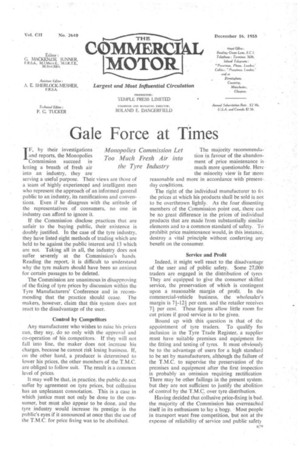Gale Force at T mes
Page 37

If you've noticed an error in this article please click here to report it so we can fix it.
IF, by their investigations and reports, the Monopolies Commission succeed in letting a breath of fresh air into an industry, they are serving a useful purpose. Their views are those of a team of highly experienced and intelligent men who represent the approach of an informed general public to an industry, its ramifications and conventions. Even if he disagrees with the attitude of the representatives of consumers, no one in industry can afford to ignore it.
If the Commission disclose practices that are unfair to the buying public, their existence is doubly justified. In the case of the tyre industry, they have listed eight methods of trading which are held to be against the public interest and 13 which are not. Taking all in all, the industry does not suffer severely at the Commission's hands, Reading the report, it is difficult to understand why the tyre makers should have been so anxious for certain passages to be deleted.
The Commission are unanimous in disapproving of the fixing of tyre prices by discussion within the Tyre Manufacturers' Conference and in recommending that the practice should cease. The makers, however, claim that this system does not react to the disadvantage of the user.
Control by Competitors Any manufacturer who wishes to raise his prices can, they say, do so only with the approval and co-operation of his competitors. If they will not fall into line, the maker does not increase his charges, because he cannot risk losing business. If, on the other hand, a producer is determined to lower his prices, the other members of the T.M.C. are obliged to follow suit. The result is a common level of prices.
It may well be that, in practice, the public do not suffer by agreement on tyre prices, but collusion has an unpleasant connotation. This is a case in which justice must not only be done to the consumer, but must also appear to be done, and the tyre industry would increase its prestige in the public's eyes if it announced at once that the use of the T.M.C. for price fixing was to be abolished. The majority recommendation in favour of the abandonment of price maintenance is much more questionable. Here the minority view is far more reasonable and more in accordance with presentday corlditions.
The right of the individual manufacturer to lix the prices at which his products shall be sold is not to be overthrown lightly. As the four dissenting members of the Commission point out, there can be no great difference in the prices of individual products that are made -from substantially similar elements and to a common standard of safety. TO prohibit price maintenance would, in this instance, destroy a vital principle without conferring any benefit on the consumer.
Service and Profit Indeed, it might well react to the disadvantage of the user and of public safety. Some 27,000 traders are engaged in the distribution of tyres They are equipped to give the consumer skilled service, the preservation of which is contingent upon a reasonable margin of profit. In the commercial-vehicle business, the wholesaler's margin is 71-121 per cent. and the retailer receives 71 per cent. These figures allow little room for cut prices if good service is to be given.
Bound up with this question is that of the appointment of tyre traders. To qualify .foi inclusion in the Tyre Trade Register, a supplier must have suitable premises and equipment for the fitting and testing of tyres. It must obviously be to the advantage of users for a high standard to be set by manufacturers, although the failure of the T.M.C. to supervise the preservation of the premises and equipment after the first inspection is probably an omission requiring rectification There may be other failings in the present system. but they are not sufficient to justify the abolition of control by the T.m.c. over tyre distribution.
Having decided that collusive price-fixing is bad. the majority of the Commission has overreached itself in its enthusiasm to lay &bogy. Most People in transport want free competition, but not at the expense of reliability of service and public safety
















































































































